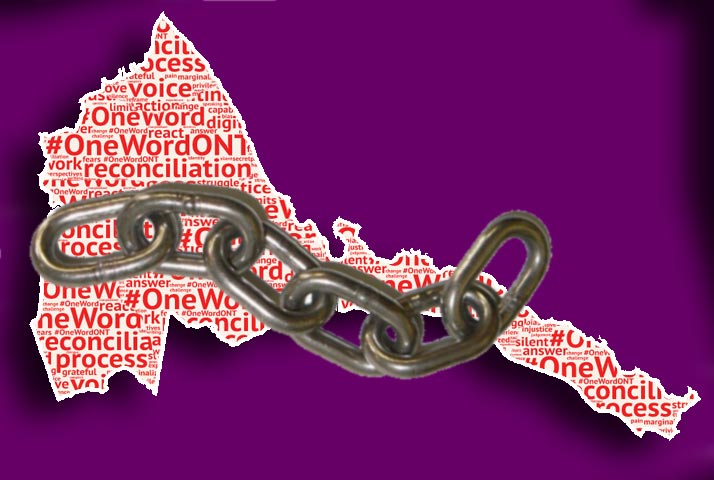The Allyship Model of Anti-Marginalization Struggle

“None are more hopelessly enslaved than those who falsely believe they are free.” Goethe
Dawit Mesfin’s recent article “All about self-liberation” has generated and stimulated discussion among the greatest notable minds of awate forum. The article and the debaters’ input provoked me to write this piece to enhance Dawit’s thesis of “self-liberation”, by framing it into pragmatic solutions, for those who are self-liberated among us as a group or as individuals. I can’t pass without appreciating the inputs of Yohannes Zerai and Ismail AA in highlighting the need of “self-assessment and self-liberation” of the Eritrean opposition movements, to redefine and redirect their struggle.
Dawit’s “self-liberation” does not only call for fight our demons but also by fighting our demons we can transform the opposition movements, to engage and to liberate our people. In doing so he tried to examine the “shattered Eritrean dream” and “the perverted power” that resides at the helm of the state of Eritrea. Moreover, Dawit didn’t shy away from making his worries known about “the negative episode that takes place within the sphere of the opposition camp” which he accounted as “regionalism, religionism, tribalism, factionalism, and closed nationalism.” I hope Dawit is not characterizing the aggrieved social groups in whatever way they are organized: as tribalists, regionalists, or religionists. I am always baffled when our elites loosely use those socio-political terms in our political discourse.
In this essay I will explain who are the self-liberated individuals or groups, how social mistrust blooms among our social groups and hence within the opposition camp; where are its roots? What are the causes to the birth of “social group” organizations? How do the self-liberated individuals and groups address the grievances of the aggrieved social groups? Why “the allyship model of struggle” is important in the anti-marginalization struggle? Why do we see allegations of Ethnic supremacy in our political discourse? These and others will be addressed in this article.
The Marginalization of Minorities in Eritrea is Real and Alive
Eritreans must come to grips with marginalization. Marginalization in Eritrea does exist be it socially, politically, or economically. It became the basis of all the mistrust within the opposition camp. The current authoritarian or tyrannical regime of the state of Eritrea is using all the tools of oppression and marginalization to stay in power. This is a fact that all our citizens are experiencing in different shape or form. Anyone who denies this fact from those who claim to be solution seekers are indeed dishonest and unprincipled individuals who sow the seeds of disagreement in the discourse of the current struggle. The current marginalizing system in Eritrea is the root of “mistrusts and ethno-grievances” in our nation and it creates conditions for the formation of Ethnic or social group organizations. Any social group that is targeted by the system of oppression or agents of the system of oppressions has the rights to organize and mobilize its social bases to fight and reassure its equitable rights–as individual citizens and as a group. Do we call fighting for equitable rights an ethnicist struggle? Absolutely not. Linguistically, Ethnicism is a prejudice based on ethnic origin or ethnic identity. Scientifically, Ethnicity is more of a sociological term that describe “culture of sizable group of people sharing a common linguistic or cultural heritage.” One can be naïve as to what ethnic and ethnicism entails. But one who advocate for equitable power sharing could not and should not be attacked as ethnicist by the dominant social group, simply for not complying with the politics of the interest of the system that wants to run the nation.
Who Are the Self-Liberated Individuals or Groups?
Robert Brezsny identified the self-liberated individuals as “those who are always tenderly wrestling and negotiating with their own shadows making preemptive strikes on their personal share of the world’s evil, fighting the good fight to keep from spewing their darkness on those around them.” If we take Brezsny’s description as a baseline for identifying our self-liberated individuals in the context of the Eritrean politics, how many of us could honestly claim they are self-liberated? A high benchmark that is difficult to meet with the nature of Eritrean politics.
For starters, here are my own benchmarks to meet the self-liberated requirements, and are less difficult to meet. Self-liberated individuals are (a) those who have liberal progressive values, who understand the pain of their people and work hard to change the quality of life of their people (b) those who strives to maintain the equilibrium of power to maintain peace within our diversity (c) those who have the ears to listen the grievances of the social make up of their people, and work hard to address them to maintain their unity in diversity (d) those who have judicious mind based on justice and fairness (e) and those who never wavered with time and circumstances, and never falter on those principles.
As Fredrick Nietzsche generously opined, that “the great epochs in our lives are at the points when we gain the courage to rebaptize our badness in to the best of us.” Henceforth. it is time to transform ourselves into “self-made heroes and heroine, by washing our own brain, healing our own pain, to command a kind of courage that causes power itself to tremble in its makeshift throne”. In short, all Eritreans must walk towards their fears to find their own power, knowing everyone in the oppressor group is part of the oppression.
The Allyship Model and The Social Justice Allies
In the political tradition of anti-racism of the white liberals in the USA, we have seen them make their own role by forming a mental image that the courts and the official political process were the driving force of anti-racist social change. But in recent years “some activists whose discourse is motivated by political radicalism rather than by liberalism have adopted a different way of foregrounding the agency of white people.” They did so by conceptualizing anti-racist struggle in terms what they termed it the “allyship.” The concept of allyship in general and the anti-racist ally in particular, did not come from the domain of social movements, instead it was imported from the social work of professionals into the social movement activism. Anne Bishop whose book of 1994 “Becoming an ally” had played a great role in popularizing the term. Allyship should not be confused with similar-sounding concept “alliance.” Alliance is “an irreducibly strategic concept that refers to the confluence of different social forces taking up one another’s demand in the context of commitment to reciprocal solidarity and mutual support.” In contrast, Allyship is undertaken by individuals not by the entire movements. Allyship is “a sincere commitment on the part of privileged person to offer ongoing support to individuals, groups, or organizations that are excluded that kind of privilege, and to take direction from them about the form that support should take.” I believe self-liberation or self-emancipation are consistent with allyship model.
How can the concept of “Allyship” be applicable in our realities, in the anti-marginalization struggle? How could we contribute to the struggle of our minorities? what is the role of progressive individuals who are self-liberated in the struggle of our minorities? All these questions, are important to address the mistrusts that hold us from moving forward. The Highlanders–the dominant social force so to speak–must open their ears to listen to the grievances of our minorities, start to show their solidarity as individuals and offer their support on the ongoing struggle of our minorities. Alliances without allyship will not lead us to success. While Allyship could help us to reduce mistrust, alliance will help us to win our common struggle against the brutal system that created all the mess we are entangled in. We must learn the various oppression in our society, because our ignorance of them always makes us part of the oppression.
Self-Liberation is not a Panacea to our Social Ills
Since false ideas have the power to control human souls, only people who value liberty have a motive to win against false ideas that control the norm of society. Self-liberated consciousness is a moral compass for our thoughts and actions. But that cannot be a strategy in our fights to win against oppression. Oppressions are embedded in the social ills of society. The conception of self-liberated individual’s idea and the conditions of the society are governed by different sets of rules. Societies are governed by mutually agreed set of rules, while individual’s thought and actions are governed by the conscious mind of the self. Our sociopolitical problems are reflections of the relationship of our social groups, who are currently venting their grievances in different forms and shapes. Are we ready to recognize their grievances and ready to address them? ‘We are all aggrieved’, is not an answer. Rather, we must address each grievance either within the national political framework or individually depending on their nature.


Awate Forum